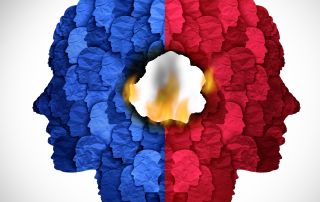Bullying
Will Trump's Shooting Bring Us Together or Pull Us Apart?
Political polarization, in families or nations, is always in flux.
Posted July 16, 2024 Reviewed by Gary Drevitch
Key points
- Intense polarization is an emotional state in which some people may be viewed as inferior or subhuman.
- Polarization can be promoted by leaders who regularly speak in "us-against-them" words.
- Everyone should be careful about what they watch and listen to and avoid repeating "us-against-them" words.

The attempted assassination of former President Donald Trump could serve as a wake-up call to a divided nation that brings us together—or it could pull us further apart. The polarization of the last few years is not unique. It can occur in families, in groups, and in politics. The past shows us that polarization is always getting worse or better, but it doesn’t stand still. It can lead to violence or it can be reduced and managed, as it often has been throughout history. The following is an excerpt from my book Our New World of Adult Bullies: How to Spot Them—How to Stop Them, explaining how we can all make it worse or better:
The Power of Polarization
Few people recognize that the same process of polarization now occurs regularly around the world, at three different levels: in families, in groups, and in politics. Polarization in all of these settings is mostly an emotional process, more than a logical or ideological one. Human logical disagreements will always exist. They are simply problems to solve. They help us consider more than one option or approach, which helps us learn over time what works best. In equal relationships, we have many ways of negotiating solutions to our differences, large and small, such as taking turns, seeking more information, compromising, or trying out both options.
Polarization is personal. Intense polarization—the frightening kind that can turn into violence—is more than a difference of logical opinions. It’s a form of primitive emotional power. It causes people to say that you, your positions, and your group are totally wrong, inferior, subhuman, or should not exist. You feel it emotionally, in your gut. The other side’s point of view feels truly life-threatening, and its members may say life-threatening things that reinforce this fear perhaps in a seemingly joking manner, but such jokes have serious implications. While polarization may have logical contributing causes, the intensity of it is emotionally driven primarily by bully leaders. They make it personal to get the people they polarize to fight one another so that the bully can gain power or keep power, like a narcissistic bully parent. Most secure parents know much better than to pit their children against one another.
Likewise, polarization is not driven by ideological disagreements themselves. Friends and family have argued about politics for centuries. But, from time to time, bully political leaders turn minor differences into intensely emotional “us-against-them” narratives. It’s about good people versus evil people, patriots versus traitors, believers versus infidels, or the deserving versus the undeserving. When people accept this false us-against-them distinction, they naturally increase the polarization—and the risk of violence.
Bullies can polarize people over anything: money, age, looks, values, nationalities, medical treatments, safety precautions, election results, and even food options. The more this primitive emotional power is repeated, the more intense the polarization. Thus, polarization grows or diminishes based on the leaders of the family, the workplace, the community, or the nation. It comes from the top down.
This is especially true in nations with bully leaders. For example, I was traveling once in Cambodia and visited the Killing Fields, where in the 1970s the Khmer Rouge slaughtered 25 percent of the Cambodian population. Pol Pot, the brutal dictator, had turned the poor and farming people against the urban government and professional people in a sweeping effort to destroy any possible opposition to his power.
Our guide had our group of 12 sit at a picnic table as he described the ways that one person after another was executed on these grounds. Then, he looked at me, pointed, and exclaimed, “You would be dead!” I asked why. “Because you wear glasses! That’s a sign that you were assumed to be in the elite classes, as in the government or universities.” Polarization can be fatal.
Polarization Comes Down From Bully Leaders
It isn’t immediately obvious that intense polarization comes from primitive emotional power, which can leave ordinary people upset and bewildered, wondering what they did to cause it. However, intense polarization doesn’t come from the bottom up. People don’t walk around polarized without a bully leader to instruct them in us-against-them thinking. People often get this backward. I didn’t realize we were so polarized. What have we done to cause this? That’s what bullies want you to think as they deny actively doing any such thing.
In reality, it isn’t “we” who have caused this. It starts from the top and the bully’s story. Using emotional repetition, the bully creates intense fear, which triggers intense anger at the bully’s target. Remember, emotions are contagious. The bully defines the crisis, the villain, and the hero (all fantasies). Then, when people repeat the emotional messages they have heard—often word for word—the polarization grows.
What We Watch, Listen to, and Repeat
We don’t have to participate in this. If a leader were to instruct a group on tolerance and unity, polarization would be at a minimum. Most people have the ability for both adversarial thinking and cooperative thinking. A leader brings out the best or the worst. The bully leaders are the ones who bring out the worst of our adversarial thinking, with detailed instructions from their bully’s stories of the terrible crisis, the evil enemy, and the hero (the bully, of course). In all these situations, bullies exaggerate the smallest disagreements or negative emotions and magnify them into major us-versus-them, win-lose, high-conflict, heroes-versus-villains disputes.
Once people are emotionally hooked, they often follow by repeating this and making it worse. Our part is in what we watch, listen to, and repeat. We didn’t cause the current polarization, but we can cause it to grow even worse with our own naïve actions, or make it grow better—with our self-restraint and respect for everyone, even those with whom we disagree.
References
1. Bill Eddy, "Chapter 12: The Power of Polarization," Our New World of Adult Bullies: How to Spot Them - How to Stop Them, 193–196. (Health Communications, Inc., 2024.)




